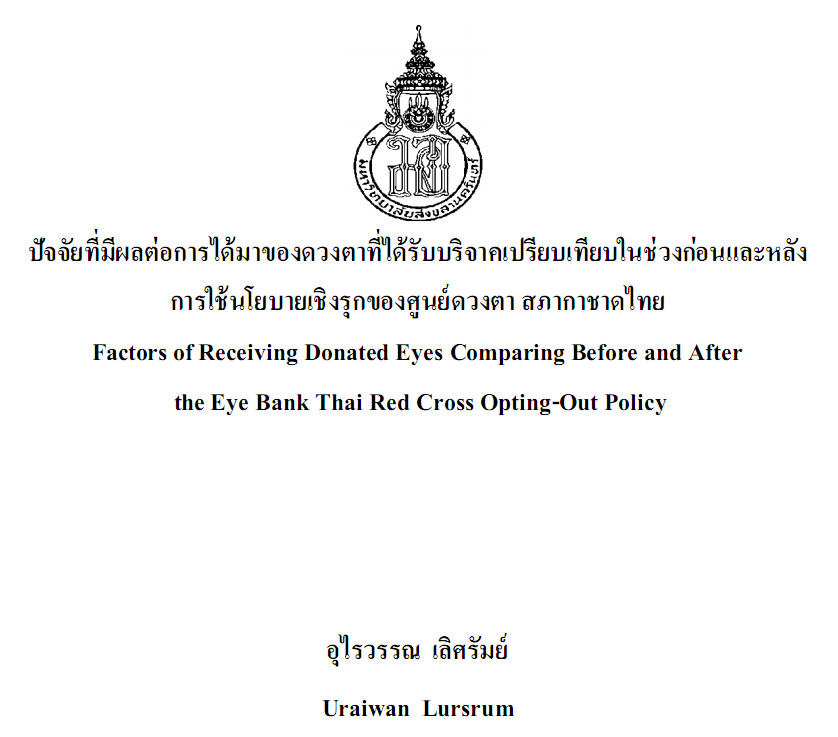ปัจจัยที่มีผลต่อการได้มาของดวงตาที่ได้รับบริจาคเปรียบเทียบในช่วงก่อนและหลังการใช้นโยบายเชิงรุกของศูนย์ดวงตา สภากาชาดไทย
ชื่อวิทยานิพนธ์ ปัจจัยที่มีผลต่อการได้มาของดวงตาที่ได้รับบริจาคเปรียบเทียบในช่วงก่อนและหลังการใช้นโยบายเชิงรุกของศูนย์ดวงตา สภากาชาดไทย
ผู้เขียน อุไรวรรณ เลิศรัมย์
สาขาวิชา การจัดการระบบสุขภาพ
ปีการศึกษา 2557
บทคัดย่อ
การวิจัยครั้งนี้เป็นการวิจัยเชิงพรรณนา โดยมีวัตถุประสงค์หลักคือ (1) เพื่อศึกษาปัจจัยที่มีผลต่อการได้มาของดวงตาที่ได้รับบริจาคทำการเปรียบเทียบในช่วงก่อนและหลังการใช้นโยบายเชิงรุก โดยศึกษาจากข้อมูลทุติยภูมิ (secondary data) ของศูนย์ดวงตาสภากาชาดไทย ระหว่างปี 2512-2555 ใช้เครื่องมือเป็นแบบบันทึกข้อมูลผู้บริจาคดวงตาย้อนหลัง จำนวน 4,862 ราย (9,601 ดวง) และ (2) เพื่อสำรวจความคิดเห็นจากผู้ปฏิบัติงานในการสะท้อนปัจจัยต่างๆ ที่ส่งผลต่อการได้มาของดวงตาบริจาค จากผู้ปฏิบัติงานในโรงพยาบาลเครือข่าย จำนวน 112 คน โดยเลือกแบบเจาะจงตามเกณฑ์ที่กำหนดไว้ ใช้แบบสอบถามที่สร้างขึ้นที่มีค่าความเชื่อมั่นเท่ากับ .96 และทำการวิเคราะห์ข้อมูลทั้งหมดโดยใช้สถิติพรรณนา ผลการศึกษาเปรียบเทียบปัจจัยที่มีผลต่อการได้มาของดวงตาที่บริจาคในช่วงก่อนและหลังการใช้นโยบายเชิงรุก พบว่า (1) ปัจจัยด้านคุณลักษณะทั่วไปของผู้บริจาคดวงตาทั้งก่อนและหลังการใช้นโยบายเชิงรุกไม่แตกต่างกัน คือ ผู้บริจาคดวงตาส่วนใหญ่เป็นเพศชายที่เสียชีวิตแล้ว อายุ 20-60 ปี สัญชาติไทย นับถือศาสนาพุทธ ส่วนปัจจัยทางด้านภูมิหลังผู้บริจาคดวงตา พบว่ามีการบริจาคดวงตาสูงขึ้นหลังมีนโยบายเชิงรุก โดยผู้บริจาคเป็นผู้ที่เสียชีวิตแล้วที่ได้แจ้งความจำนงไว้ก่อนเสียชีวิตหรือญาติให้การยินยอมหลังเสียชีวิต โดยเฉพาะผู้บริจาคที่มีสาเหตุการตายด้วยโรคประจำตัวและประสบอุบัติเหตุที่มีสถานที่เสียชีวิตคือในโรงพยาบาล (2) ปัจจัยด้านคุณลักษณะทั่วไปของผู้ปฏิบัติงาน พบว่าพื้นที่ที่มีผู้บริจาค การที่มีหน่วยงานจัดเก็บ มีผู้จัดเก็บดวงตาและมีผู้เจรจา จะมียอดบริจาคดวงตาสูงขึ้นหลังใช้นโยบายเชิงรุก สำหรับด้านระยะทาง ในระยะทางไม่เกิน 100 กิโลเมตรสามารถจัดเก็บดวงตาที่บริจาคได้เพิ่มขึ้น และไประยะทางไกลได้เพิ่มขึ้นสูงสุดถึงระยะทาง 400 กิโลเมตรหลังมีการใช้นโยบายเชิงรุก ส่วนผลการสำรวจความคิดเห็นจากผู้ปฏิบัติงานที่ช่วยสะท้อนปัจจัยต่าง ๆ ที่มีผลต่อการได้มาของดวงตาที่ได้รับบริจาค พบว่าภาพรวมของปัจจัยจากสภาวการณ์ภายในมีความสำคัญอยู่ในระดับมาก คือ (1) ปัจจัยส่วนบุคคลของผู้ปฏิบัติงาน (2) ด้านการมีประสบการณ์ในการดำเนินงานของศูนย์ดวงตา (3) ด้านความพร้อมโรงพยาบาล ตามประเภทของโรงพยาบาลที่มีผลงานการดำเนินงานจัดหาและบริการดวงตา และจำนวนจักษุแพทย์ (4) ด้านทรัพยากรการบริหาร อยู่ในระดับมากทุกด้าน ตั้งแต่ด้านบุคลากร การจัดการ เครื่องมือ และการเงิน ตามลำดับ ส่วนปัจจัยจากสภาวการณ์ภายนอก พบว่าอยู่ในระดับมากคือ ด้านนโยบายภาครัฐ ด้านสังคมวัฒนธรรม ด้านเทคโนโลยี และด้านกฎหมาย ตามลำดับ ส่วนด้านเศรษฐกิจมีความสำคัญอยู่ในระดับปานกลาง สรุปปัจจัยที่มีผลต่อการได้รับดวงตาบริจาคเพิ่มขึ้นหลังใช้นโยบายเชิงรุก ได้แก่ ปัจจัยจากสภาวการณ์ภายในที่เป็นผลมาจากปัจจัยทางด้านผู้ปฏิบัติงาน และปัจจัยสภาวการณ์ภายนอกที่มีผลมาจากด้านนโยบายภาครัฐ จึงควรสนับสนุนนโยบายการรับบริจาคดวงตาให้เป็นนโยบายแห่งชาติต่อไป
Thesis Title Factors of Receiving Donated Eyes Comparing Before and After the Eye Bank Thai Red Cross Opting-Out Policy
Author Mrs.Uraiwan Lursrum
Major Program Health System Management
Academic year 2014
Abstract
This research was performed by using a descriptive study design to describe the 2 main objectives: (1) the factors influence on an eye donation in comparison between before and after using proactive policy and (2) the opinion of practitioners on the reflection of an eye donation factors. The former, was carried out by using secondary data from the Donation Center of the Eye Bank of Red cross of Thailand during the years 1969 to 2012 of 4,862 eyes donors (9,601 donated eyes). The latter, was investigated in 112 selective participants who work in the network hospital by using questionnaires to gather data with the reliability of 0.96. All data then was analyzed by using descriptive statistics.
The results revealed that (1) the factors of typical characteristics of the eye donors both before and after use the proactive policy were not different. The eyes donors were mostly 20-60 years male Buddhists who died in the hospitals. However, the factors of the background of eyes donors increasingly influenced on eye donation after use proactive policy. Most donors were the persons who intended to donate before death or by the permission of their close relatives after their death, with underlying their own diseases and accidents and those died in hospitals. (2) For the practitioner factors, demonstrated the higher eye donation after use the proactive policy in particular areas: having abandon of eye donors, having of collection sectors, having data collectors, and having negotiations. Furthermore, the ability of donated eye collection had increased in distance of 100 kilometers and up to 400 kilometers after having a proactive policy. The practitioners reflected a variety of factors that affect the acquisition of the donated eyes consisting of internal and external situations. For the internal situation factors that were reflected in a high level including (1) personal factors, (2) the well-experienced centers (3) the availability of hospitals based on type, number of ophthalmologists, and eye supply service-related hospitals. (4) For the resource management, was also reflected at a high levels including human resources, management, instruments, and finances, respectively. In addition, the factors of external situations that were the key of feedbacks at a high level were government policy, social and culture, technology, and law, respectively. While, an economic was important in the medium level.
In conclusion, the factors that affected the eye donation were increased after use the proactive policy including factors of internal situation that resulted from practitioners and factors of external situation as a result of the government policy. Therefore, the policies of eyes donation should be promoted as the national policy to increase a number of eye donors in later on.
Relate topics
- วิทยานิพนธ์ - การประยุกต์ใช้แนวคิดคราวด์ซอร์สซิงในการทำแผนที่เครือข่ายเฝ้าระวังและช่วยเหลือผู้ประสบภัยพิบัติ จังหวัดสงขลา
- การประยุกต์ใช้แผนที่ผลลัพธ์ในการประเมินผลการดำเนินงานเครือข่ายสร้างเสริมสุขภาพและครอบครัวตำบลโคกม่วง อำเภอเขาชัยสน จังหวัดพัทลุง
- ปัจจัยที่มีผลต่อการรับรู้ความเสี่ยงและพฤติกรรมการป้องกันและควบคุม ความเสี่ยงจากการทำงานของบุคลากรแผนกซักฟอกโรงพยาบาลชุมชน
- การพัฒนาคู่มือปฏิบัติการการทำแผนที่ทุนมนุษย์เพื่อสุขภาวะของเครือข่าย ชุมชนแบบมีส่วนร่วม กรณีศึกษา เครือข่ายสัจจะลดรายจ่ายวันละ 1 บาท เพื่อทำสวัสดิการ
- การจัดสวัสดิการชุมชนและความต้องการสวัสดิการชุมชนเพื่อสุขภาวะ ของเครือข่ายสัจจะลดรายจ่ายวันละ 1 บาท เพื่อทำสวัสดิการภาคประชาชนจังหวัดสงขลา
- สุขภาวะของสมาชิกเครือข่ายสัจจะลดรายจ่ายวันละ 1 บาท เพื่อทำสวัสดิการภาคประชาชน จังหวัดสงขลา
- การศึกษาปัจจัยส่งเสริมประสิทธิภาพการบำบัดในกลุ่มกิจกรรมบำบัด ผู้ป่วยจิตเวช กรณีศึกษา โรงพยาบาลสงขลานครินทร์
- การประยุกต์ใช้แผนผังวิเคราะห์ความเสี่ยงเพื่อพัฒนาโปรแกรมการจัดการความเสี่ยงจากการทำงานของแรงงานกรีดยางพาราโดยชุมชนมีส่วนร่วม
